I’ve never hid my disdain for how the Duck Stamp skews perceptions of who uses and supports public refuges in the United States. Thankfully, others are challenging the assumptions inherent in this very flawed system. Ingrid Taylar at The Free Quark is in the middle of an astute inquiry into the issue of non-hunters and the NWR system as well as potential alternatives to the status quo. I urge conservation minded readers to engage in a dialog with Ingrid, here on 10,000 Birds, and anywhere else we can get out the message that hunters and anglers aren’t the only supporters of habitat preservation!
Recent Posts
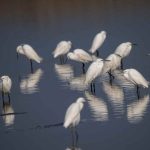 Birding Shanghai in February 2026By Kai Pflug
Birding Shanghai in February 2026By Kai Pflug Birding Lodges of the World: The Nest, South AfricaBy Editor
Birding Lodges of the World: The Nest, South AfricaBy Editor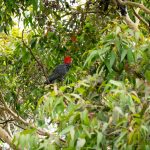 The Year of the Gang-gang CockatooBy Sanjana Raj
The Year of the Gang-gang CockatooBy Sanjana Raj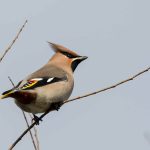 The Chemistry of Birds (35): AlcoholBy Kai Pflug
The Chemistry of Birds (35): AlcoholBy Kai Pflug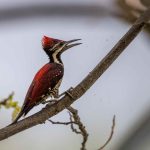 Three Photos: Sri Lanka WoodpeckersBy Editor
Three Photos: Sri Lanka WoodpeckersBy Editor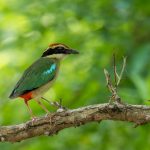 Why Birders Are Suddenly Showing Up at ProtestsBy Peter
Why Birders Are Suddenly Showing Up at ProtestsBy Peter Ubatuba, São Paulo, Brazil – Profile for BirdersBy Editor
Ubatuba, São Paulo, Brazil – Profile for BirdersBy Editor
Posting Calendar
| DAY | WRITER(S) | SERIES (w) |
|---|---|---|
| MON | Kai (w) | Birding Lodges |
| TUE | Donna (m) Susan (m) Hannah (m) Fitzroy (m) Grace (m) | Bird Guides |
| WED | Leslie (bw) Faraaz (bw) | Ask a Birder |
| THU | Paul (w) Cathy (bw) Kelly (m) | Birder’s Lists |
| FRI | David (w) Kendall (m) | Species Spotlight |
| SAT | Peter (bw) Luca (bw) | From the Archives |
| SUN | Clive (w) Sanjana (m) | Three Photos |
| w weekly, bw biweekly, m monthly | ||
| Any time: Dragan, Erika, Jason, John, Mark, Rolf, Sara; Location Profiles | ||
See here for info on the writers.
Newsletter
Signup and receive notice of new posts!
Thank you!
You have successfully joined our subscriber list.



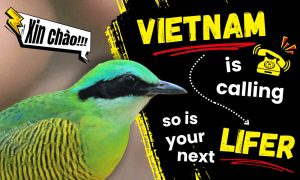



From a federal employee perspective and a retail perspective I can see the federal government having little interest in creating a stamp for non hunters. It takes unbelievable amounts of paperwork and committees to get something like the duck stamp established. Birders do not have the lobbying power that hunters do.
I think that hunters and birders not working together will be the end of an already great program to acquire land for wildlife habitat. As hunting numbers decrease and birders refusing to buy the stamp increase, the federal government is just as likely to do away with the program completely and everybody–including birds will lose.
Philosophically and temperamentally, I am opposed to funding habitat and wildlife conservation with “user fees.” Our natural resources are precisely that–OUR natural resources–and everyone’s tax dollars should be used to preserve them. Perhaps the most important thing birders and other natural history hobbyists can be doing right now is writing in support of the Teaming With Wildlife Act, http://www.teaming.com/2009_Fly_in_Day/pdf/Teaming%20With%20Wildlife%20Act%20Fact%20Sheet.pdf.
Pragmatically, I understand that we are very unlikely to divert funds from such vital projects as killing people and enriching the oil companies, and we’re probably stuck with the duck stamp model for the foreseeable future. I think it is utterly unrealistic to hope for a duplication of that program with a “non-hunting stamp.” Instead, buy duck stamps, display them proudly, and work, if you must, to get the name changed to simply “Federal Migratory Bird Conservation Stamp.”
I’m not sure whose perceptions are being “skewed” by my buying a duck stamp.
Great idea. The refuges could be greatly improved commercially and socially by scaling back the hunting focus and really reaching out to all the people coming for lower impact activities.
Also, the fact that the duck stamp is also a hunting license means some refuges insist on this silly etiquette for sticking the stamp on a form with all this hunting text and signing it. It’s like, I’m not coming here to hunt. I’m coming here to look at birds. And so what if I’m sharing the stamp. That’s a silly rule too. If you want to do that have a family stamp that’s $10 more or something. Just focus on making it as easy as possible to get in and focus on managing the refuge for the entire range of uses it allows for, most of which are lower impact than hunting. I like Duck stamps and think they are fine as a monetary option (setting aside the discussion of how hunting on refuges should be managed or eliminated). But the refuges should absolutely offer simpler to use stamps and stamps with all kinds of objects: geological features, plants, reptiles, beautiful landscapes, hiking and camping scenes, people having a picknick on the beach. All kinds of things.
Thanks for the comments, all. Even if we don’t agree, we should continue to discuss this issue.
And Rick, if you’re not sure whose perceptions are being skewed by non-hunters buying duck stamps, take a look at the first comment in the Facebook thread for this post: http://www.facebook.com/permalink.php?story_fbid=10150360764341687&id=241274576686
Can’t get to facebook, sorry!
I’ll reprint it here:
Such silly thoughtless nonsense. Hunters and fishermen are excellent stewards of wild places and things, several orders of magnitude MORE than all the birders and greenies put together. Get a clue–and quit making enemies of those you simply don’t understand.
I’m not a hunter and I bought my first Duck Stamp this year. I’m not thrilled with the hunting part, but it isn’t gonna stop just cause I don’t like it, so may as well help protect the land for the birds till some better program comes along.
Thanks, Mike. Quite a tone that writer has!
Apart from that, though, s/he has a point–or at least has had one historically.
I’m definitely among the blackest of kettles here, but each of us birders should sit back and calculate what percentage of our annual birding expenditure goes to conservation–and what percentage to optics, books, airline tickets, hotels, food, subscriptions, and on and on. I’d bet dollars to doughnuts that most hunters pay more in P-R taxes and permits. We need to change that.
@Birdchick: They managed to do it Ohio [get a wildlife stamp]. I see no reason why it couldn’t happen on a national level. And saying something shouldn’t be done because it is hard is a poor argument. Finally, not buying a duck stamp does not mean that birders will stop working with hunters, but that birders will stop funding a conservation stream for which hunters and fishermen get all the credit.
I don’t see the advantage in birders’ no longer “funding a conservation stream,” whoever gets “credit” for it.
@Rick Wright: Because if birders’ conservation dollars are going into a funding stream that is used for hunters’ interests over those of birders then birders are getting the short end of the stick.
If only all hunters had the same mind-set as Pete Dunne. Have you read “Arctic Autumn” yet? It contains the best treatise on hunting I’ve ever read.
Having seen this discussion crop up from time to time, it always seems to me anyway, it ends up dividing into the birders should hate hunters cause everyone knows all hunters want to do is kill everything and all you need to do is look at the level of violence today and the destruction of our wild places. Everyone knows hunters are to blame since they’re all one step above cavemen.
I realize I’m over-dramatic there but as in ANY activity/hobby/sport/group it is made up of individuals, and must be looked at as such. There are good and bad.
I am a person who hunts, deer, not waterfowl just because I don’t care to, but I am also a birder. As both a birder and hunter, I care deeply for our wild places. I buy my hunting and park permits, but I also belong to the ABA, ABC, and Cornell. And my state ornithological organization, as well as the local birding group.
As the earlier poster mentioned, I’m trying to put my money where my mouth is – and do not believe hunters and birders cannot coexist and work together towards a common goal.
The truth is, like it or not, the money talks, and the hunting lobbies have more. Contribute to the birding causes, contact your representatives, be a responsible birder and a good example for others, especially youngsters.
And by all means, should you observe a hunter, or anyone for that matter, call the law and report it. Be a good witness. I guess I should mention I’m a deputy sheriff as well, and retired military. And yes, Lord help me, I also have a gun or two in the house as well as my Sibley and binoculars.
Joe
Should have said there, hunter breaking the law, not just call a cop when you see a hunter. Obviously, my grammar and typing skills lack. Excuse please. Joe ????
Joe, don’t worry about your typing skills. Good thing you clarified that cop comment though!
My point should definitely not be construed as anti-hunter. Hunting and fishing organizations and individual hunters and anglers make admirable contributions to conservation. This issue has absolutely nothing to do with diminishing those contributions or the activities themselves.
Instead, look at this stance as specifically, enthusiastically pro-birder. Until a significant revenue stream can be attached to non-extractive wildlife enthusiasts like birders, hikers, and nature photographers, we will continue to be denied a seat at the table. Yes, all of us nature lovers have a lot of common interests that should continue to be promoted and funded. But where the different groups disagree, non-extractive wildlife watchers lack the power to promote action and legislation.
Mike – thank you for your response, and accepting my lack of iPhone keypad skills!
After I posted, I re-read my post and agree I may have come off just a tad bit defensive there. Ha. Maybe a lot.
I just get frustrated sometimes when I feel as though I should be embarrassed because I enjoy birding, but enjoy hunting as well and think the two can coexist. In fact, they have to.
As to your point about having a seat at the table. I wish I had an answer for you, but I am at a loss as well. Other than my comments concerning supporting the appropriate organizations, I am at a loss too unfortunately.
But as they say, it could be worse. Look at what is going on there on Cyprus between the “hunting” lobby and nature conservators. Just horrible that this behavior is tolerated. But that is an entirely different topic.
Thanks for your forum and allowing an open, frank, and respectful discussion!
Good birds!
Joe
Having read all the comments on this post I must agree with Corey and Mike’s last comment that the problem lies not with hunters, the problem is that “wildlife enthusiasts like birders, hikers, and nature photographers” get no credit for our contributions and therefore no clout.
The Federal Duck Stamp Office already produces two duck stamps every year, the regular $15 stamp and a $5 Junior Duck Stamp. They also have several educational programs for youth like their “let’s go outside” program.
I don’t see why the USFWS would balk at the prospect of creating a separate stamp for non-hunters if there was enough of an outcry for them.
As has been shown in discussions brought up by Julie Zickefoose on the Sandhill Crane hunt, there are now many more wildlife enthusiasts that don’t hunt than there are hunters and anglers and we need a separate voice. We need a seat at the table. We need to start a national campaign for a non-hunter “Federal Migratory Bird Conservation Stamp.”
I have always thought that birders could and should do more to conserve birds and their habitats. Non-hunting birders should be given the opportunity to buy a stamp that stands apart from the Duck Stamp. There is no reason that a stamp couldn’t be created. If the government doesn’t want to do it, then we, the birding community need to do it ourselves. How many of us are supporting American Bird Conservancy? This organization is putting real dollars on the ground to protect birds and their habitats. How many of us are purchasing Smithsonian bird friendly certified coffee?
I don’t see how birds benefit from birders not buying the duck stamp.
@Sharon- I don’t think anyone is making an argument to dissuade birders from buying Duck Stamps, only advocating for a second, parallel, revenue stream that better illustrates the actual impact non-consumptive users of those resources have.
The way I see it, some birds benefit a lot from money raised by duck stamps, some benefit a little and some benefit not at all. And so long as non-consumptive users of NWRs are not counted, the needs of nongame species are never going to be prioritized in the event of a conflict with game species, nor are the needs of birders going to prioritized over the needs of hunters regardless of our numbers, real or imagined.
I see this all the time when refuges are managed for waterfowl instead of migrating shorebirds, or birder access to NWRs are limited during hunting season. Unless we can show our numbers, our needs will never be considered. And why should they when there’s absolutely no difference between us and hunters on the bottom line?
I agree with many of the points addressed here, by Nate, Mike, Corey, Mary, et al. Thank you for encouraging this discussion. One additional aspect overlooked in the comments so far, is that the NRA has been party to drafting legislation which dramatically alters the way refuges are managed, giving hunters overarching “priority use,” despite their disproportionate representation in numbers. The 40 percent land-use cap was lifted even earlier, opening refuge lands to more and more hunting pressure on wildlife. On some refuges, non-hunters are shut out of significant portions of the refuges during height of migratory bird season.
There is no comparable birding consortium to challenge or address these priority allocations on our public refuges when they directly conflict with the interests of a much larger constituency: non-extractive users. We number 77+ million as birders, photographers and wildlife watchers while hunters number 12.5 million (using USFWS numbers).
That is the point: that a viable funding alternative would properly attribute one of the most powerful tools any of us have at our disposal –our dollars — and would at least provide a collective financial voice on decisions that affect our all of our public refuge lands.
That’s not to imply that birders and wildlife viewers are necessarily pitted against hunters. On the contrary. As others have noted, there are conservation-minded hunters and there are hunters who are also birders. There is clearly an overlap of conservation interests in many respects. But, in my field experience, often sharing land with hunters, there is no question that on some significant issues, we disagree strongly.
The point several people are making above is that when those issues come into play, when land-use priorities are set or changed, those of us who disagree are told (as I have been many times) “well, it’s hunters who buy the duck stamps.” If you buy a stamp online, you will not be asked if you are a hunter or a non-hunter. There is no clear delineation.
I don’t see any inherent conflict between asking for a non-extractive refuge stamp, and simultaneously protecting the interests of birds, wildlife and habitat on those refuges. Duck Stamps have purchased 3 percent of refuge lands. Congress appropriates a significant portion using our tax dollars. And, sadly, refuges have been historically under-funded despite these various measures. The economic power of millions of wildlife watchers could create a large revenue stream for our National Wildlife Refuge system. But if we are pay, as hunters do — and I strongly support that — it’s only fair to attribute the funds accordingly, rather than expect non-extractive users to enthusiastically embrace a status quo that doesn’t take into account their various interests on public refuges.
For me, it’s what Nate said. It isn’t about disliking hunters particularly. It’s simply that the conservation and management methods that increase game species are not necessarily all that great for non-game species. I’m not worried about birders getting the short end of the stick as much as I am about non-game birds, to say nothing of non-game mammals, herps, fish, and insects, getting the short end of the stick.
@Carrie. Totally agree — one of the most significant non-hunting “interests” concerning refuges.
Ingrid nailed it. It’s not about animosity towards hunters, it’s about making our specific interests, that often but not always intersect with those of hunters, are represented proportional to our numbers. This birders vs hunters straw man that us consistently raised with this issue is obnoxious and misleading. Yes, we all support habitat acquisition, but let’s stop pretending that our interests are met entirely by the management, including large scale feeding, of waterfowl and the micromanaging and stocking of introduced, and often exotic, upland game birds Because it isn’t. It just isn’t.
We all hear about the Duck Stamp program’s legitimately impressive boast that something like 98% of money raised goes directly to habitat acquisition. Its great that birders buy the stamps, but with that kind of low overhead, why is it so unreasonable to want a non-game version? Or to think it could be successful?
I was linked here from Birdchick. I’ve been following the controversy there for awhile. I agree with Ingrid and several others here- I am totally cool with hunting (by the way, permits do not cost that much, folks- we got one this year), but I do not always like the way land is managed for hunting. I also do not like my money to say “this person is a hunter and therefore wants the land managed in a way that is conductive to hunting”. I want my money to say “I am a conservation advocate and I want my money to be used to leave the land the !@#$%& alone where possible, and if necessary, managed to be conductive to preserving ALL species, regardless of human use”.
Sharon, I already mentioned this on your blog in the past, but I see things haven’t changed so I’ll say it again- being condescending and trying to shame people is not going to change anyone’s mind. I don’t see anyone saying “DON’T BUY DUCK STAMPS!”. Please note that.
Ok. Now that we have discussed this over, under, sideways and down, what are we going to do about it?
I suggest we start a positive campaign for a non-consumptive bird conservation stamp from the USFWS by contacting all the birding organizations we belong to and getting them involved. The American Birding Association, American Bird Conservancy, and National Audubon Society seem like good places to start. I brought the issue up at a recent Northern California Audubon Council Meeting and my fellow members thought it was a good idea also.
I see no reason why the USFWS wouldn’t embrace the idea as well as birding organizations. They should see it as another revenue stream.
I think that if we go about this the right way, we bird bloggers, using all the social networking tools we have now, should be able to make this happen.
What say you?
I agree with Larry. He has mentioned some groups that could get this process started. Cornell’s Lab of Ornithology is another. All have good membership bases. Ideally, a staff member from one of these organizations could take the lead to coordinate this effort.
I’m with you, Larry. Let’s be the change we want to see in the world.
Larry, I’m with you, too. The inspiration for my original post on this subject was an email exchange I had with an associate at a national wildlife organization, one that’s involved in refuge issues. The subject of a “wildlife watchers” stamp was, indeed, raised and I was told there could be plans to roll out such a proposal in the very near future. I know building public support is critical, particularly since any such change represents a significant paradigm shift. I’ll get back in touch with my contact there and see if this particular project is moving toward viability. Either way, count me in as an advocate for helping to make this happen.
@Ingrid thanks! I think your communication skills would be a great asset to this endeavor and I really appreciate your willingness to help us tackle this inequity of representation on national refuge conservation issues.
So, I guess this awesome idea just died somewhere??? I can’t find a mention of it anywhere in 2012, what happened?
Deb, no worries, the idea hasn’t died, it is very much alive. It’s just been in rumination and “committee.” 🙂
Hi all,
I am the person who originated the No Hunting Stamp idea. It is NOT intended as an “anti-hunting symbol.” It is to call attention to waterfowl hunting on National Wildlife Reserves, which were originally created to preserve wildlife, and to promote returning them to no-hunting sanctuaries for waterfowl.
A small minority (hunters) is using the reserves for private purpose to the exclusion of everyone else for several months every year. At the peak of migratory season, anyone not hunting is excluded from most of the reserve. This is not right. The killing of thousands of birds for “sport” is a separate issue, but it should not be taking place on public land designated for preserving wildlife.
I think most of you missed this point.
Marlin Greene
Hi Marlin,
I got your point and totally agree that the intended purpose of the National Wildlife Reserves has been bastardized to support the hunting community via the exclusion to all but them during peak migration periods…seems a bit backwards and it is they(hunters) that should be excluded. If the only way to prove that the non-hunting community can monetarilay support the National Wildlife Reserves through eco-tourism and the purchase of a non hunting stamp, than we shoudl do it; afterall it is the $ that seems to be the driving force behind all the decisions being made about who can truly enjoy these, our natural resources.